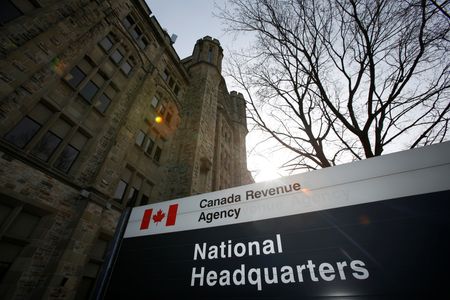 1
1 1
1
By Ismail Shakil and Steve Scherer
OTTAWA (Reuters) -About 155,000 federal workers in Canada walked off the job on Wednesday after failing to reach a deal for higher wages and work-from-home guarantees, a strike that affects a range of public services from tax returns to passport renewals.
The Public Service Alliance of Canada (PSAC) union and the federal government said negotiations are ongoing, and Liberal Prime Minister Justin Trudeau stressed the urgency of resolving the dispute.
“I know that Canadians will not be terribly patient if it continues too long,” Trudeau told reporters.
PSAC says it is the biggest strike against a single employer in Canada’s history, and large walkouts by civil servants are uncommon in Canada.
Striking workers picketed and waved union flags in front of Trudeau’s office in Ottawa, one of 250 picket lines across the country. Across the street, a few hundred people paraded on the lawn in front of parliament.
Crystal Patterson, 32, who works for the transport ministry office that organizes state flights for the prime minister and others, said her main issue is getting a contract that covers recent cost of living increases.
“The union is doing right by us by trying to get us a fair contract,” she said. “I will be picketing as long as PSAC has us picket.”
The union, which has been in collective bargaining for a new contract since 2021, had set a deadline of 9 p.m. ET (0100 GMT) on Wednesday for a deal.
“Talks are ongoing, but we’re going to stay out here as long as it takes,” PSAC President Chris Aylward told cheering picketers. Apart from wages, PSAC also wants to the new agreement to recognize the right to work remotely.
“We cannot write a blank cheque,” said Mona Fortier, president of the Treasury Board, urging PSAC to compromise.
The contract negotiations cover two main groups of employees: 120,000 workers under the Treasury Board and more than 35,000 revenue agency workers.
The strike will affect several federal services and could delay tax refunds since the filing deadline for most is the end of the month. Passport renewals ahead of peak summer travel are also set to face delays.
The strike also involves about 65% of employees at the Canadian Grain Commission, including most inspectors of outbound grain at ports, which is “significantly impacted” by the strike, the commission said. Canada is a major wheat and canola exporter.
The federal government said in a statement that it presented a “fair, competitive offer to the PSAC,” including a 9% wage increase over three years, and that it would continue negotiations to reach an agreement quickly.
Tax agency workers want a pay bump of 22.5% over three years, while the Treasury Board workers are seeking a 13.5% pay rise over three years. Inflation peaked at 8.1% last year but has since come down to about half of that.
The full impact of the strike has yet to be seen, said Nathan Janzen, assistant chief economist at the Royal Bank of Canada.
“There’s obviously still the concern that this contract could set a precedent for other public sector union negotiations,” he said. “If it lasted to the end of April it could knock two- or three-tenths off of April GDP… It’s a pretty large strike by historical comparison for Canada.”
(Reporting by Ismail Shakil and Steve Scherer in Ottawa; additional reporting by Eric Beech, Dan Whitcomb, Rod Nickel, Fergal Smith and Kanjyik Ghosh; Editing by Robert Birsel, Jonathan Oatis and Josie Kao)